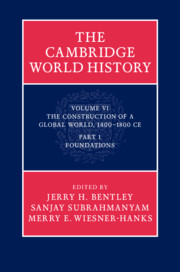Book contents
- The Cambridge World HistoryVOLUME VI
- The Cambridge World History
- The Cambridge World History
- Copyright page
- Dedication
- Contents
- Figures
- Maps
- Tables
- Contributors
- Preface
- 1 Introduction
- Part One Global matrices
- Part Two Macro-regions
- Part Three Large-scale political formations
- Part Four Crossroads regions
- 14 Crossroads region: Central Asia
- 15 Crossroads region: Southeast Asia
- 16 The Caribbean region: crucible for modern world history
- 17 Crossroads region: the Mediterranean
- Part Five Overview
- Index
- References
16 - The Caribbean region: crucible for modern world history
from Part Four - Crossroads regions
Published online by Cambridge University Press: 05 May 2015
- The Cambridge World HistoryVOLUME VI
- The Cambridge World History
- The Cambridge World History
- Copyright page
- Dedication
- Contents
- Figures
- Maps
- Tables
- Contributors
- Preface
- 1 Introduction
- Part One Global matrices
- Part Two Macro-regions
- Part Three Large-scale political formations
- Part Four Crossroads regions
- 14 Crossroads region: Central Asia
- 15 Crossroads region: Southeast Asia
- 16 The Caribbean region: crucible for modern world history
- 17 Crossroads region: the Mediterranean
- Part Five Overview
- Index
- References
Summary
Keywords
- Type
- Chapter
- Information
- The Cambridge World History , pp. 393 - 414Publisher: Cambridge University PressPrint publication year: 2015

